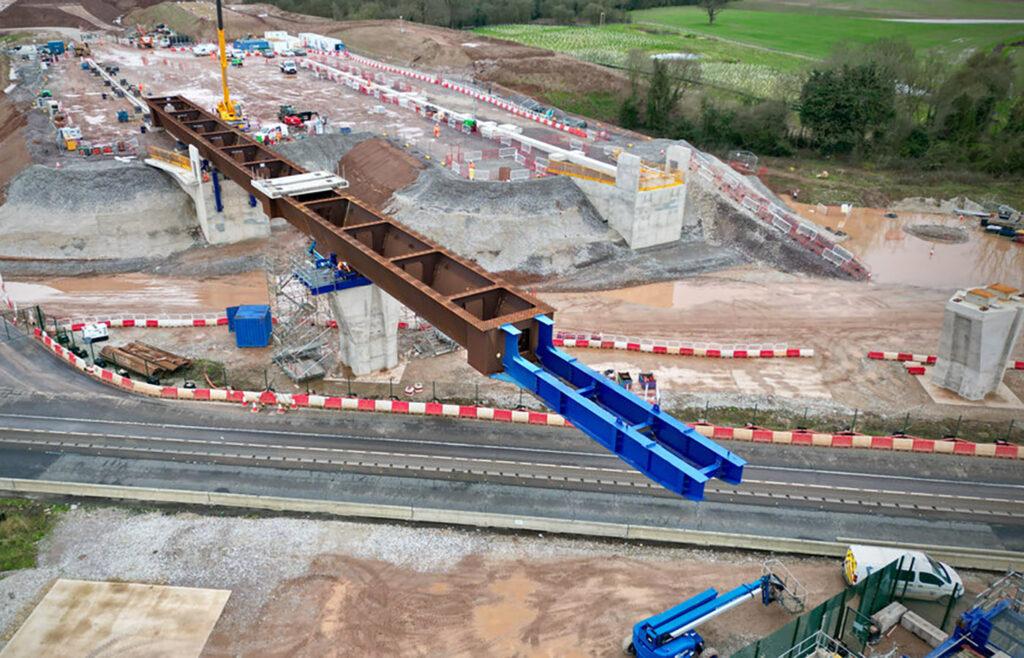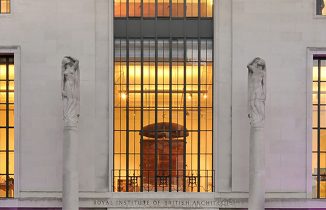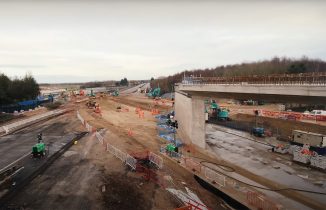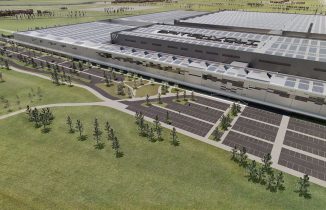
Balfour Beatty VINCI contractors working for HS2 has moved the first huge viaduct section into place over the motorway network in North Warwickshire, marking a milestone for the project’s Delta Junction as HS2 reaches peak construction in the region.
Specialist steelwork company Victor Buyck Steel Construction, working for Balfour Beatty VINCI, used a specialist push-pull technique to move the 84 metre, 300 tonne steel viaduct section into place over the westbound link road between the M6 and M42 near Coleshill.
This is the first of two moves to install the deck for HS2’s ‘East Link Viaduct’, which is part of the triangular Delta Junction. The second operation in April will create the full 158 metre long composite deck over both westbound and eastbound motorway link roads. Further work, including in-situ concrete deck works and parapets installation will be undertaken to complete the structure.
The team completed the move ahead of schedule in a total of 11.5 hours during a weekend closure of the motorway link roads. Working in close collaboration with National Highways, the roads were re-opened at 2.35am on Sunday morning.
Before the end of this year, a similar two-stage operation will move the identical ‘West Link Viaduct’ which runs parallel to the East Link Viaduct.
This section of the triangular Delta Junction enables high speed trains to travel between London, Interchange Station in Solihull and Birmingham Curzon Street Station.
Alex Staines, Sub Agent – Composite Structures at Balfour Beatty VINCI said: “Delivering this milestone is a really proud moment for me and the team. We’ve worked very closely with our partners National Highways to make sure that this activity was delivered safely and efficiently.
“By using an innovative launching technique, we were able to build the viaduct deck offline and move it into position over a weekend closure of the highway, greatly reducing the impact on road users.”
Stephen Powell, Head of Delivery – Area North at HS2 Ltd said: “Building the East Link Viaduct in the Delta Junction is not only a key milestone for the HS2 project in the Midlands but is also critical to our earthworks mass haul strategy to keep construction traffic off the local roads.
“While we continue to construct HS2 in this area, it will provide a crossing route over the highway for construction vehicles to move excavated material from the Bromford Tunnel to other work sites in the Delta Junction, removing thousands of lorry movements from the local road network.”
Tibo Suvée, Project Manager at Victor Buyck Steel Construction said: “Our team were pleased to deliver this successful operation, which was the first time our push-pull jacking system has been used in the UK. The technique provides greater flexibility during the launching operation by allowing the bridge to be moved backwards or both ways if needed.
“This is really the first milestone of four, and over the next eight months we look forward to delivering the second launch of the East Link Viaduct and the same two-stage operation for the West Link Viaduct, which will complete these first viaducts on Delta Junction.”
National Highways Senior Network Planner, Frank Bird, said: “This has been a complex and collaborative effort to both minimise disruption for people using our roads but also enabling this engineering feat to take place.
“We are pleased with how smoothly the operation went and are grateful to road users for their patience while this ambitious work took place.”
The first launch takes the viaduct section to its halfway position over the westbound link road. Following completion of the first launch, three further steel girders will be welded to the back of the first structure, and 40 precast slabs will be installed on top of the girders. In April, this entire structure, weighing 1,100 tonnes will then be moved to its final position over both westbound and eastbound motorway link roads.
The Delta Junction is made up of embankments, cuttings and a total of 13 viaducts taking high speed tracks over motorways, local roads, existing rail lines, rivers and floodplains. The viaducts include six precast segmental viaducts, four composite viaducts and three low viaducts.
The layout of the Delta Junction triangle means the railway from London curves west on a spur towards Birmingham Curzon Street Station. As trains come out of Birmingham, the line heads north to meet the main HS2 line, which will then connect to the West Coast Main Line to Manchester. The third side of the triangle allows trains to run between London and Manchester without stopping at Birmingham.





